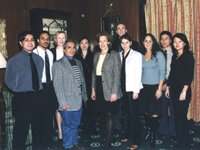
Faculty members and students at the Griffis Faculty Club.
From May 31 to June 14, a group of eight Cornell graduate students met at the Biodiversity Laboratory in Punta Cana, Dominican Republic, for an intensive two-week course titled "The Distribution, Chemistry and Biology of Natural Products: A Graduate Course in Plant Biochemistry." And on Nov. 14 in the Griffis Faculty Club, students and faculty received a description of the Punta Cana course as described by Rhamee and Andrea Basso, Ph.D. candidates of Weill Cornell's Graduate School of Medical Sciences. Attendees also received information on the Biodiversity Laboratory in Punta Cana from Dr. Eloy Rodriguez, the James A. Perkins Professor of Environmental Studies at Cornell University and director of Cornell University Labs at Punta Cana, and James Perkins, professor of environmental biology at Cornell University (Ithaca).
The interdisciplinary curriculum, which took place this past summer, included doctoral students from various countries learning about aspects of field botany, evaluations of phytochemical diversity, and basic chemical-ecological assessments of biological activity. Students were given the opportunity to use extensive laboratory facilities with Dominican and other international scientists in one of the region's most beautiful and ecologically rich areas. The students from Cornell University Graduate School (Ithaca) and Weill Cornell Medical College and Graduate School of Medical Sciences (New York City) hailed from Chile, China, the Dominican Republic, Romania and the United States. The course faculty comprised Dominican, Mexican and U.S. scientists.
In March 2001, the Medical College and Cornell University (Ithaca) celebrated the establishment of the new Biodiversity Laboratory at Punta Cana at dedication ceremonies held at the facility. Located on a 1,555-acre ecological reserve set aside by the Punta Cana Ecological Foundation, the Biodiversity Laboratory allows scientists and students from the Ithaca campus and the Medical College to perform innovative research on how natural herbal and botanical products can benefit human health. More than 50 plant families and 175 plant species can be found at the Ecological Reserve and many of these species are native and unique to the Dominican Republic.
The Biodiversity Laboratory is a large facility that includes a chemistry laboratory with basic equipment and instrumentation; a biology laboratory with microbiology and tissue culture equipment; plant-processing equipment; and a herbarium. The site also houses a dormitory and administrative offices, in addition to a large conference room for nightly lectures.
The Biodiversity Laboratory, which performs basic research to identify, isolate and evaluate botanical and herbal products for potential pharmacological benefits, is associated with Weill Cornell Medical College's Center for Complementary and Integrative Medicine, of which Dr. Mary Charlson, the William T. Foley Distinguished Professor of Medicine and chief of the division of general internal medicine at the Medical College, is the executive director.
Those who played a key role in the development of the Biodiversity Laboratory are Cornell University alumnus and philanthropist Theodore Kheel, co-owner of the Punta Cana Resort and Club and a dedicated supporter of ecological concerns; Grupo Punta Cana and its director, Mr. Frank Rainieri; the Task Foundation; and the Punta Cana Ecological Foundation.

